MNG03236 Business Professional Development: A Report on Self-Awareness
VerifiedAdded on 2023/04/03
|12
|3175
|452
Report
AI Summary
This report provides a detailed analysis of self-awareness and its impact on career choices and professional development. It discusses various elements of self-awareness, including personality traits, values, motivators, emotional intelligence, leadership skills, and understanding of power and politics. The report also reflects on the application of Jung's theory of personality and Kolb's theory of learning cycle in decision-making and problem-solving. The author identifies their own strengths and weaknesses, relating them to potential career paths such as HR management and leadership roles in the hospitality sector. The report concludes by emphasizing the importance of continuous self-development and strategic planning for achieving career success. Desklib offers a wide range of resources, including past papers and solved assignments, to support students in their academic and professional journeys.
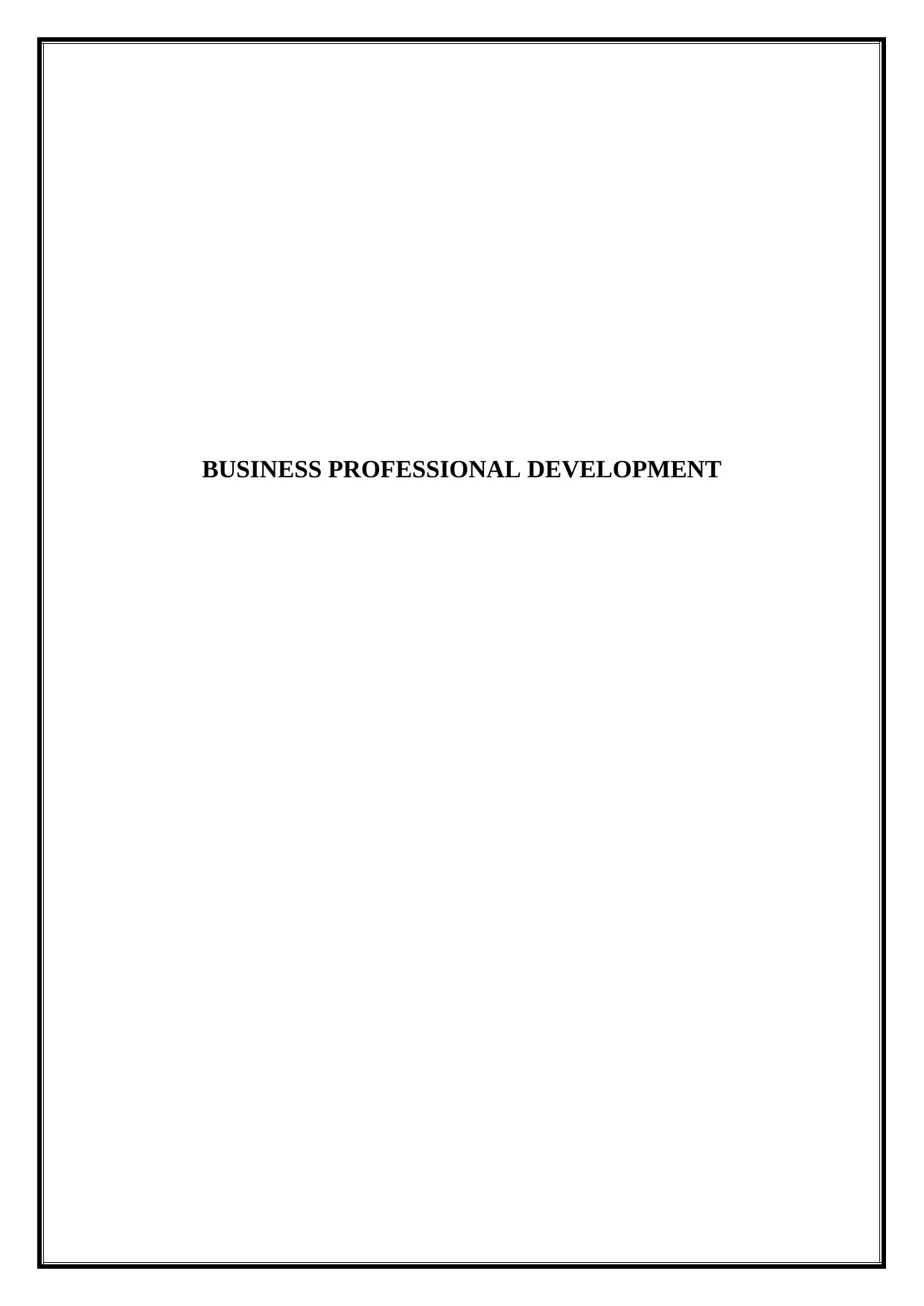
BUSINESS PROFESSIONAL DEVELOPMENT
Paraphrase This Document
Need a fresh take? Get an instant paraphrase of this document with our AI Paraphraser
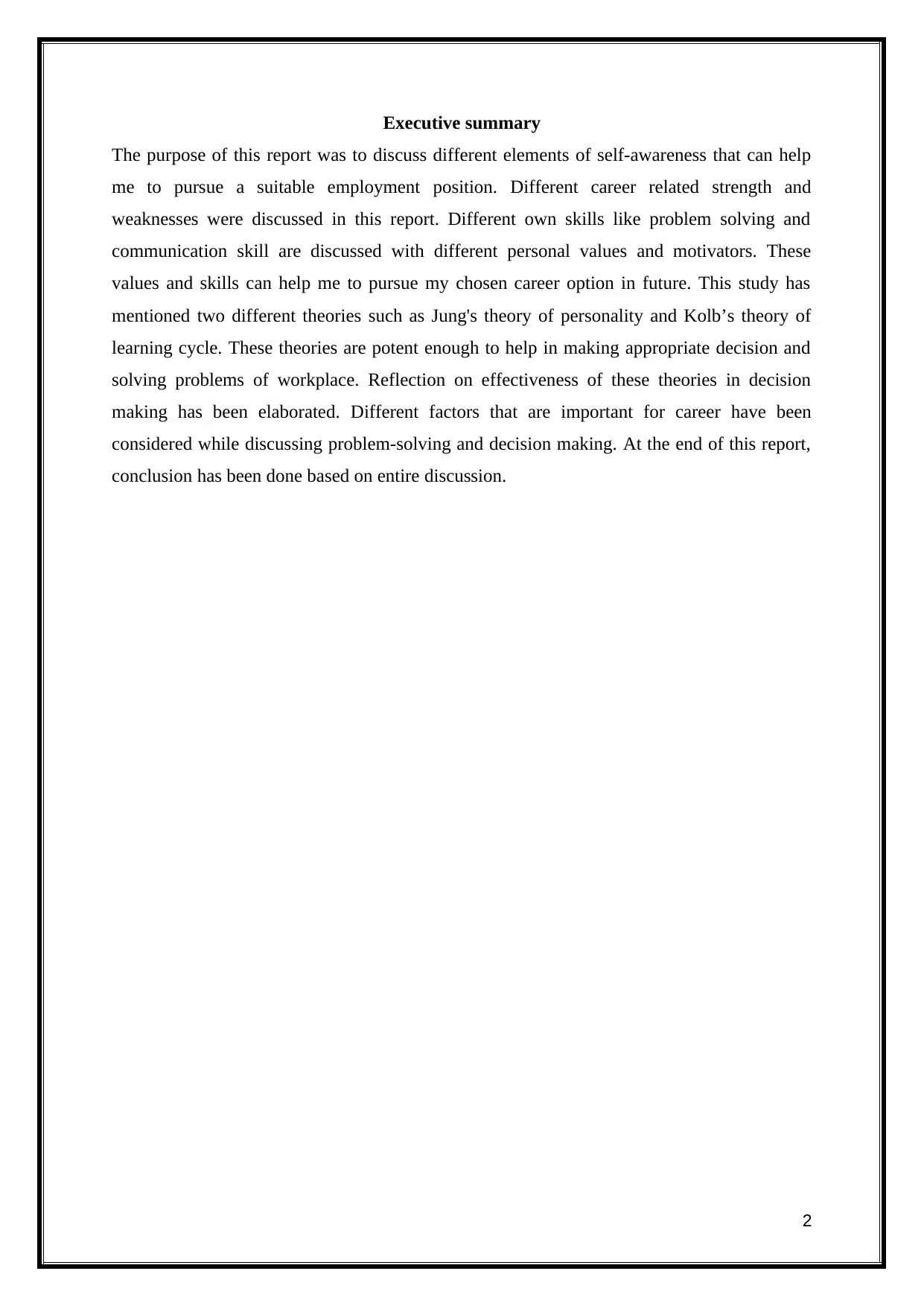
Executive summary
The purpose of this report was to discuss different elements of self-awareness that can help
me to pursue a suitable employment position. Different career related strength and
weaknesses were discussed in this report. Different own skills like problem solving and
communication skill are discussed with different personal values and motivators. These
values and skills can help me to pursue my chosen career option in future. This study has
mentioned two different theories such as Jung's theory of personality and Kolb’s theory of
learning cycle. These theories are potent enough to help in making appropriate decision and
solving problems of workplace. Reflection on effectiveness of these theories in decision
making has been elaborated. Different factors that are important for career have been
considered while discussing problem-solving and decision making. At the end of this report,
conclusion has been done based on entire discussion.
2
The purpose of this report was to discuss different elements of self-awareness that can help
me to pursue a suitable employment position. Different career related strength and
weaknesses were discussed in this report. Different own skills like problem solving and
communication skill are discussed with different personal values and motivators. These
values and skills can help me to pursue my chosen career option in future. This study has
mentioned two different theories such as Jung's theory of personality and Kolb’s theory of
learning cycle. These theories are potent enough to help in making appropriate decision and
solving problems of workplace. Reflection on effectiveness of these theories in decision
making has been elaborated. Different factors that are important for career have been
considered while discussing problem-solving and decision making. At the end of this report,
conclusion has been done based on entire discussion.
2
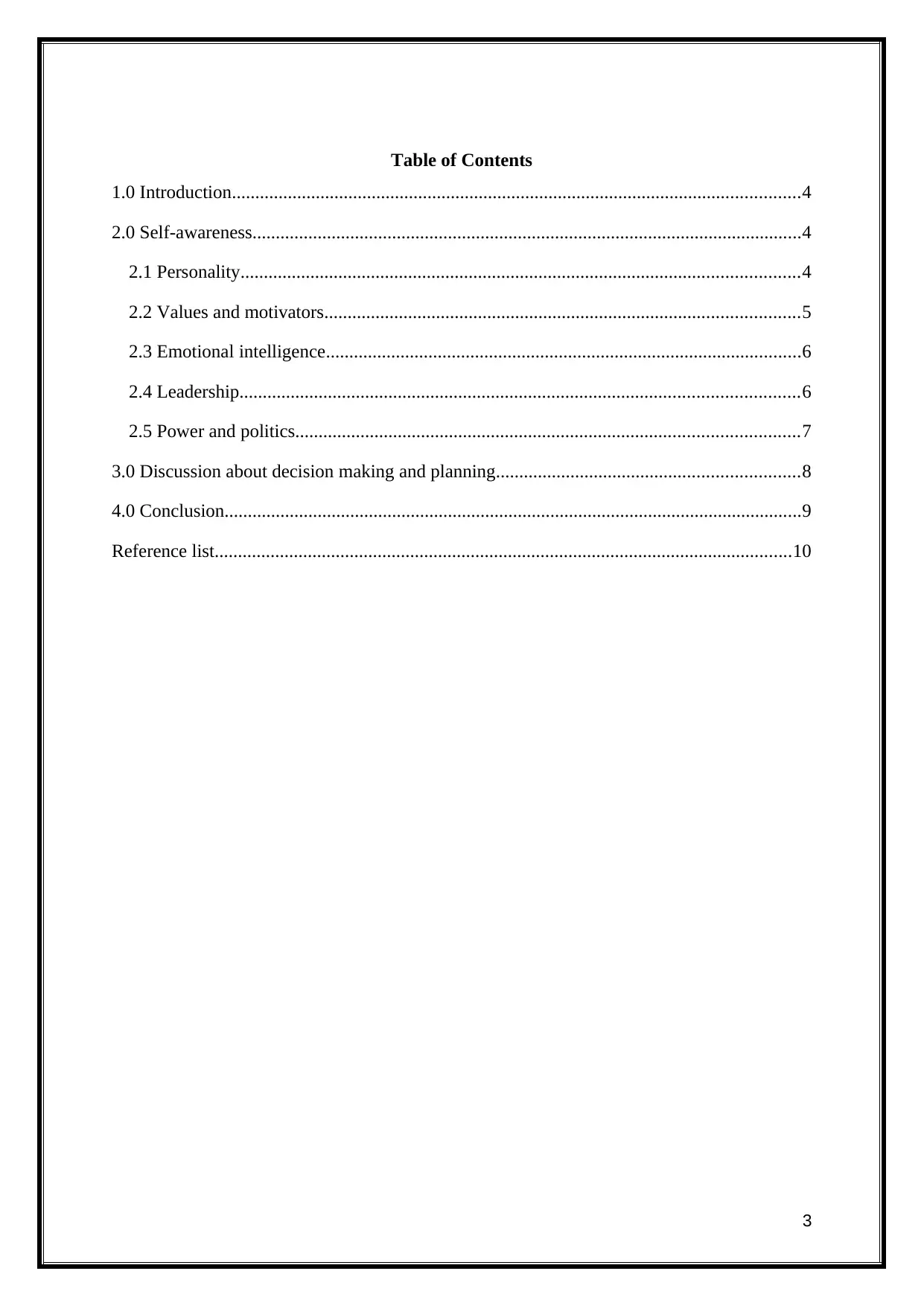
Table of Contents
1.0 Introduction..........................................................................................................................4
2.0 Self-awareness......................................................................................................................4
2.1 Personality........................................................................................................................4
2.2 Values and motivators......................................................................................................5
2.3 Emotional intelligence......................................................................................................6
2.4 Leadership........................................................................................................................6
2.5 Power and politics............................................................................................................7
3.0 Discussion about decision making and planning.................................................................8
4.0 Conclusion............................................................................................................................9
Reference list............................................................................................................................10
3
1.0 Introduction..........................................................................................................................4
2.0 Self-awareness......................................................................................................................4
2.1 Personality........................................................................................................................4
2.2 Values and motivators......................................................................................................5
2.3 Emotional intelligence......................................................................................................6
2.4 Leadership........................................................................................................................6
2.5 Power and politics............................................................................................................7
3.0 Discussion about decision making and planning.................................................................8
4.0 Conclusion............................................................................................................................9
Reference list............................................................................................................................10
3
⊘ This is a preview!⊘
Do you want full access?
Subscribe today to unlock all pages.

Trusted by 1+ million students worldwide
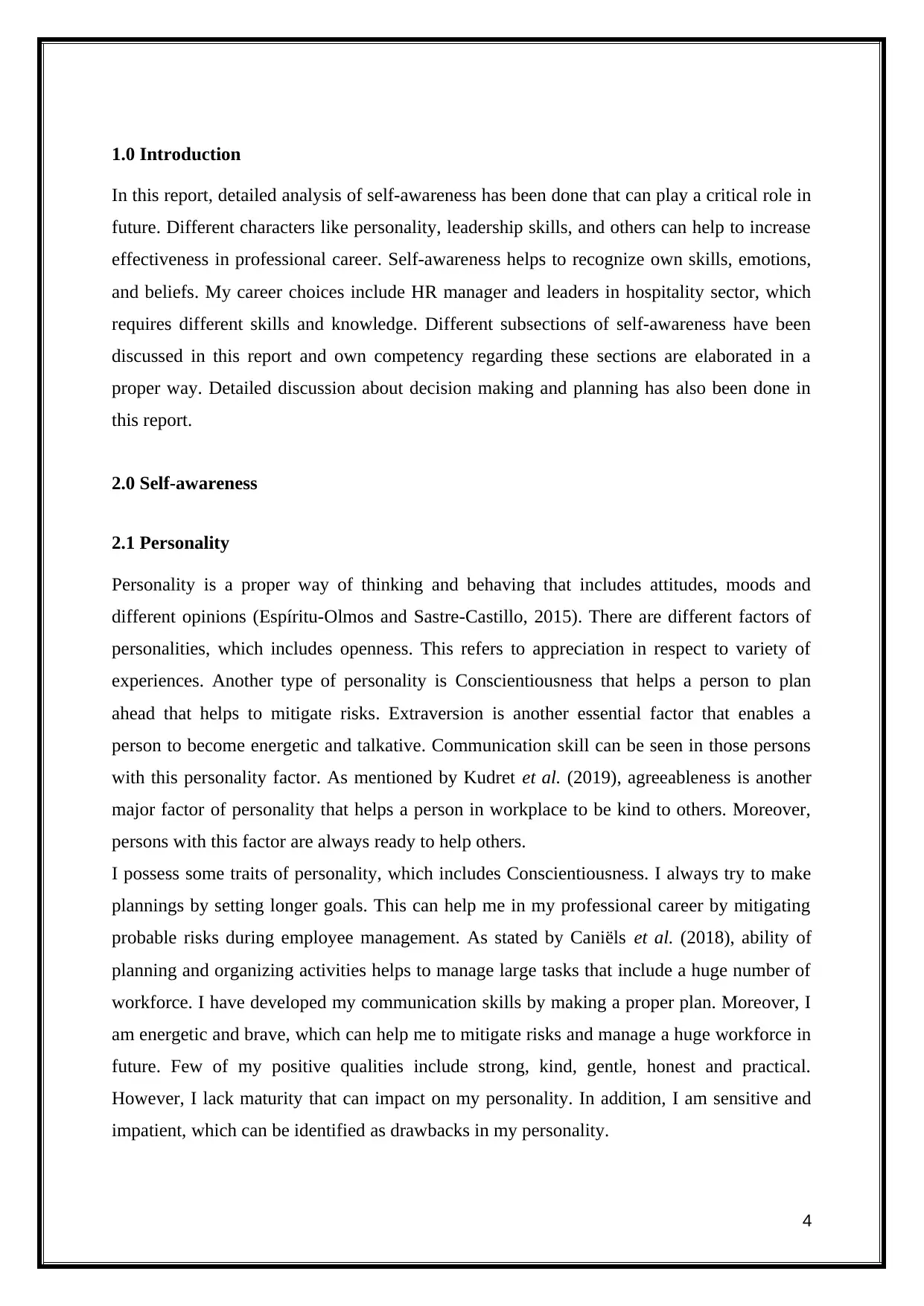
1.0 Introduction
In this report, detailed analysis of self-awareness has been done that can play a critical role in
future. Different characters like personality, leadership skills, and others can help to increase
effectiveness in professional career. Self-awareness helps to recognize own skills, emotions,
and beliefs. My career choices include HR manager and leaders in hospitality sector, which
requires different skills and knowledge. Different subsections of self-awareness have been
discussed in this report and own competency regarding these sections are elaborated in a
proper way. Detailed discussion about decision making and planning has also been done in
this report.
2.0 Self-awareness
2.1 Personality
Personality is a proper way of thinking and behaving that includes attitudes, moods and
different opinions (Espíritu-Olmos and Sastre-Castillo, 2015). There are different factors of
personalities, which includes openness. This refers to appreciation in respect to variety of
experiences. Another type of personality is Conscientiousness that helps a person to plan
ahead that helps to mitigate risks. Extraversion is another essential factor that enables a
person to become energetic and talkative. Communication skill can be seen in those persons
with this personality factor. As mentioned by Kudret et al. (2019), agreeableness is another
major factor of personality that helps a person in workplace to be kind to others. Moreover,
persons with this factor are always ready to help others.
I possess some traits of personality, which includes Conscientiousness. I always try to make
plannings by setting longer goals. This can help me in my professional career by mitigating
probable risks during employee management. As stated by Caniëls et al. (2018), ability of
planning and organizing activities helps to manage large tasks that include a huge number of
workforce. I have developed my communication skills by making a proper plan. Moreover, I
am energetic and brave, which can help me to mitigate risks and manage a huge workforce in
future. Few of my positive qualities include strong, kind, gentle, honest and practical.
However, I lack maturity that can impact on my personality. In addition, I am sensitive and
impatient, which can be identified as drawbacks in my personality.
4
In this report, detailed analysis of self-awareness has been done that can play a critical role in
future. Different characters like personality, leadership skills, and others can help to increase
effectiveness in professional career. Self-awareness helps to recognize own skills, emotions,
and beliefs. My career choices include HR manager and leaders in hospitality sector, which
requires different skills and knowledge. Different subsections of self-awareness have been
discussed in this report and own competency regarding these sections are elaborated in a
proper way. Detailed discussion about decision making and planning has also been done in
this report.
2.0 Self-awareness
2.1 Personality
Personality is a proper way of thinking and behaving that includes attitudes, moods and
different opinions (Espíritu-Olmos and Sastre-Castillo, 2015). There are different factors of
personalities, which includes openness. This refers to appreciation in respect to variety of
experiences. Another type of personality is Conscientiousness that helps a person to plan
ahead that helps to mitigate risks. Extraversion is another essential factor that enables a
person to become energetic and talkative. Communication skill can be seen in those persons
with this personality factor. As mentioned by Kudret et al. (2019), agreeableness is another
major factor of personality that helps a person in workplace to be kind to others. Moreover,
persons with this factor are always ready to help others.
I possess some traits of personality, which includes Conscientiousness. I always try to make
plannings by setting longer goals. This can help me in my professional career by mitigating
probable risks during employee management. As stated by Caniëls et al. (2018), ability of
planning and organizing activities helps to manage large tasks that include a huge number of
workforce. I have developed my communication skills by making a proper plan. Moreover, I
am energetic and brave, which can help me to mitigate risks and manage a huge workforce in
future. Few of my positive qualities include strong, kind, gentle, honest and practical.
However, I lack maturity that can impact on my personality. In addition, I am sensitive and
impatient, which can be identified as drawbacks in my personality.
4
Paraphrase This Document
Need a fresh take? Get an instant paraphrase of this document with our AI Paraphraser
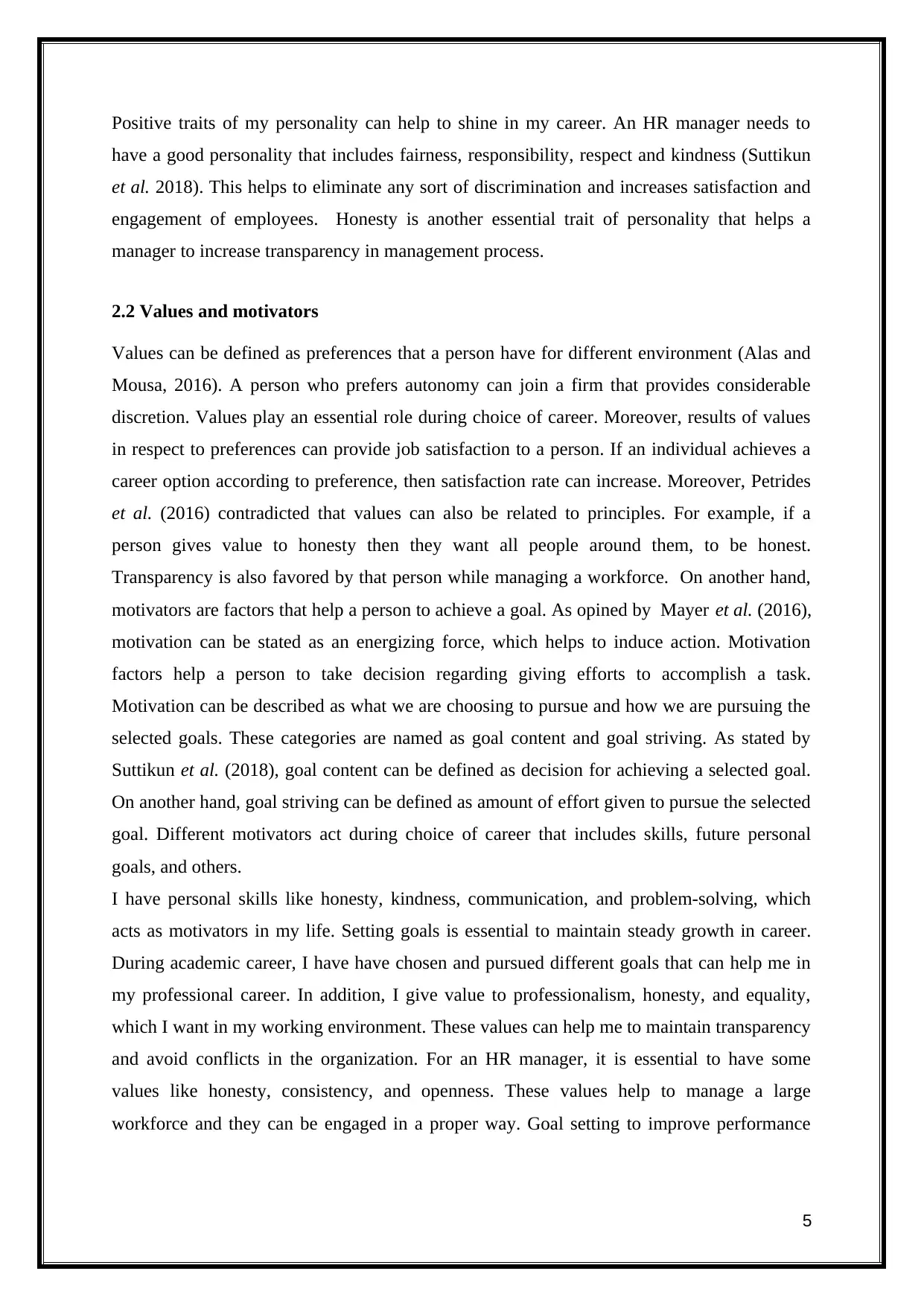
Positive traits of my personality can help to shine in my career. An HR manager needs to
have a good personality that includes fairness, responsibility, respect and kindness (Suttikun
et al. 2018). This helps to eliminate any sort of discrimination and increases satisfaction and
engagement of employees. Honesty is another essential trait of personality that helps a
manager to increase transparency in management process.
2.2 Values and motivators
Values can be defined as preferences that a person have for different environment (Alas and
Mousa, 2016). A person who prefers autonomy can join a firm that provides considerable
discretion. Values play an essential role during choice of career. Moreover, results of values
in respect to preferences can provide job satisfaction to a person. If an individual achieves a
career option according to preference, then satisfaction rate can increase. Moreover, Petrides
et al. (2016) contradicted that values can also be related to principles. For example, if a
person gives value to honesty then they want all people around them, to be honest.
Transparency is also favored by that person while managing a workforce. On another hand,
motivators are factors that help a person to achieve a goal. As opined by Mayer et al. (2016),
motivation can be stated as an energizing force, which helps to induce action. Motivation
factors help a person to take decision regarding giving efforts to accomplish a task.
Motivation can be described as what we are choosing to pursue and how we are pursuing the
selected goals. These categories are named as goal content and goal striving. As stated by
Suttikun et al. (2018), goal content can be defined as decision for achieving a selected goal.
On another hand, goal striving can be defined as amount of effort given to pursue the selected
goal. Different motivators act during choice of career that includes skills, future personal
goals, and others.
I have personal skills like honesty, kindness, communication, and problem-solving, which
acts as motivators in my life. Setting goals is essential to maintain steady growth in career.
During academic career, I have have chosen and pursued different goals that can help me in
my professional career. In addition, I give value to professionalism, honesty, and equality,
which I want in my working environment. These values can help me to maintain transparency
and avoid conflicts in the organization. For an HR manager, it is essential to have some
values like honesty, consistency, and openness. These values help to manage a large
workforce and they can be engaged in a proper way. Goal setting to improve performance
5
have a good personality that includes fairness, responsibility, respect and kindness (Suttikun
et al. 2018). This helps to eliminate any sort of discrimination and increases satisfaction and
engagement of employees. Honesty is another essential trait of personality that helps a
manager to increase transparency in management process.
2.2 Values and motivators
Values can be defined as preferences that a person have for different environment (Alas and
Mousa, 2016). A person who prefers autonomy can join a firm that provides considerable
discretion. Values play an essential role during choice of career. Moreover, results of values
in respect to preferences can provide job satisfaction to a person. If an individual achieves a
career option according to preference, then satisfaction rate can increase. Moreover, Petrides
et al. (2016) contradicted that values can also be related to principles. For example, if a
person gives value to honesty then they want all people around them, to be honest.
Transparency is also favored by that person while managing a workforce. On another hand,
motivators are factors that help a person to achieve a goal. As opined by Mayer et al. (2016),
motivation can be stated as an energizing force, which helps to induce action. Motivation
factors help a person to take decision regarding giving efforts to accomplish a task.
Motivation can be described as what we are choosing to pursue and how we are pursuing the
selected goals. These categories are named as goal content and goal striving. As stated by
Suttikun et al. (2018), goal content can be defined as decision for achieving a selected goal.
On another hand, goal striving can be defined as amount of effort given to pursue the selected
goal. Different motivators act during choice of career that includes skills, future personal
goals, and others.
I have personal skills like honesty, kindness, communication, and problem-solving, which
acts as motivators in my life. Setting goals is essential to maintain steady growth in career.
During academic career, I have have chosen and pursued different goals that can help me in
my professional career. In addition, I give value to professionalism, honesty, and equality,
which I want in my working environment. These values can help me to maintain transparency
and avoid conflicts in the organization. For an HR manager, it is essential to have some
values like honesty, consistency, and openness. These values help to manage a large
workforce and they can be engaged in a proper way. Goal setting to improve performance
5
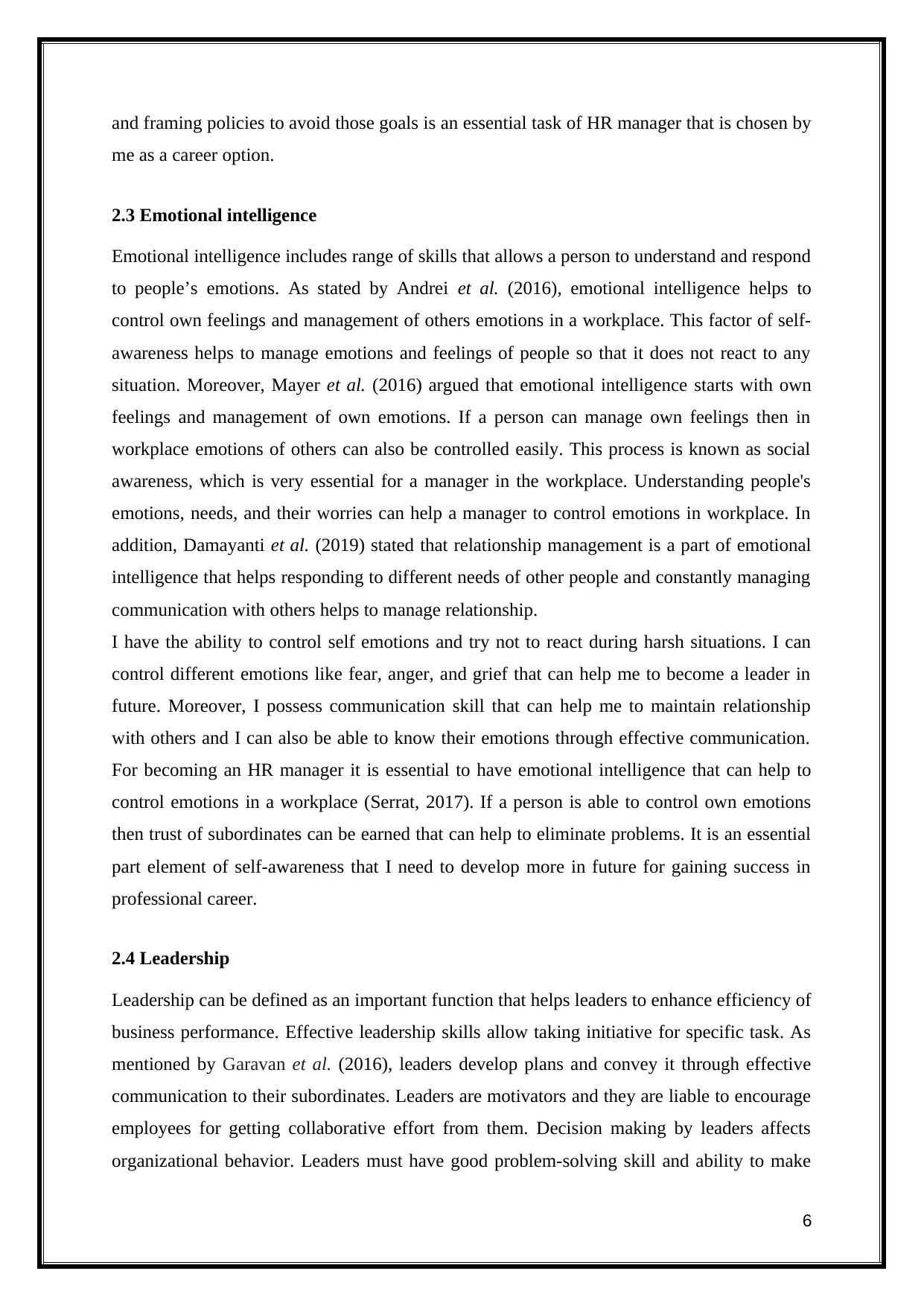
and framing policies to avoid those goals is an essential task of HR manager that is chosen by
me as a career option.
2.3 Emotional intelligence
Emotional intelligence includes range of skills that allows a person to understand and respond
to people’s emotions. As stated by Andrei et al. (2016), emotional intelligence helps to
control own feelings and management of others emotions in a workplace. This factor of self-
awareness helps to manage emotions and feelings of people so that it does not react to any
situation. Moreover, Mayer et al. (2016) argued that emotional intelligence starts with own
feelings and management of own emotions. If a person can manage own feelings then in
workplace emotions of others can also be controlled easily. This process is known as social
awareness, which is very essential for a manager in the workplace. Understanding people's
emotions, needs, and their worries can help a manager to control emotions in workplace. In
addition, Damayanti et al. (2019) stated that relationship management is a part of emotional
intelligence that helps responding to different needs of other people and constantly managing
communication with others helps to manage relationship.
I have the ability to control self emotions and try not to react during harsh situations. I can
control different emotions like fear, anger, and grief that can help me to become a leader in
future. Moreover, I possess communication skill that can help me to maintain relationship
with others and I can also be able to know their emotions through effective communication.
For becoming an HR manager it is essential to have emotional intelligence that can help to
control emotions in a workplace (Serrat, 2017). If a person is able to control own emotions
then trust of subordinates can be earned that can help to eliminate problems. It is an essential
part element of self-awareness that I need to develop more in future for gaining success in
professional career.
2.4 Leadership
Leadership can be defined as an important function that helps leaders to enhance efficiency of
business performance. Effective leadership skills allow taking initiative for specific task. As
mentioned by Garavan et al. (2016), leaders develop plans and convey it through effective
communication to their subordinates. Leaders are motivators and they are liable to encourage
employees for getting collaborative effort from them. Decision making by leaders affects
organizational behavior. Leaders must have good problem-solving skill and ability to make
6
me as a career option.
2.3 Emotional intelligence
Emotional intelligence includes range of skills that allows a person to understand and respond
to people’s emotions. As stated by Andrei et al. (2016), emotional intelligence helps to
control own feelings and management of others emotions in a workplace. This factor of self-
awareness helps to manage emotions and feelings of people so that it does not react to any
situation. Moreover, Mayer et al. (2016) argued that emotional intelligence starts with own
feelings and management of own emotions. If a person can manage own feelings then in
workplace emotions of others can also be controlled easily. This process is known as social
awareness, which is very essential for a manager in the workplace. Understanding people's
emotions, needs, and their worries can help a manager to control emotions in workplace. In
addition, Damayanti et al. (2019) stated that relationship management is a part of emotional
intelligence that helps responding to different needs of other people and constantly managing
communication with others helps to manage relationship.
I have the ability to control self emotions and try not to react during harsh situations. I can
control different emotions like fear, anger, and grief that can help me to become a leader in
future. Moreover, I possess communication skill that can help me to maintain relationship
with others and I can also be able to know their emotions through effective communication.
For becoming an HR manager it is essential to have emotional intelligence that can help to
control emotions in a workplace (Serrat, 2017). If a person is able to control own emotions
then trust of subordinates can be earned that can help to eliminate problems. It is an essential
part element of self-awareness that I need to develop more in future for gaining success in
professional career.
2.4 Leadership
Leadership can be defined as an important function that helps leaders to enhance efficiency of
business performance. Effective leadership skills allow taking initiative for specific task. As
mentioned by Garavan et al. (2016), leaders develop plans and convey it through effective
communication to their subordinates. Leaders are motivators and they are liable to encourage
employees for getting collaborative effort from them. Decision making by leaders affects
organizational behavior. Leaders must have good problem-solving skill and ability to make
6
⊘ This is a preview!⊘
Do you want full access?
Subscribe today to unlock all pages.

Trusted by 1+ million students worldwide
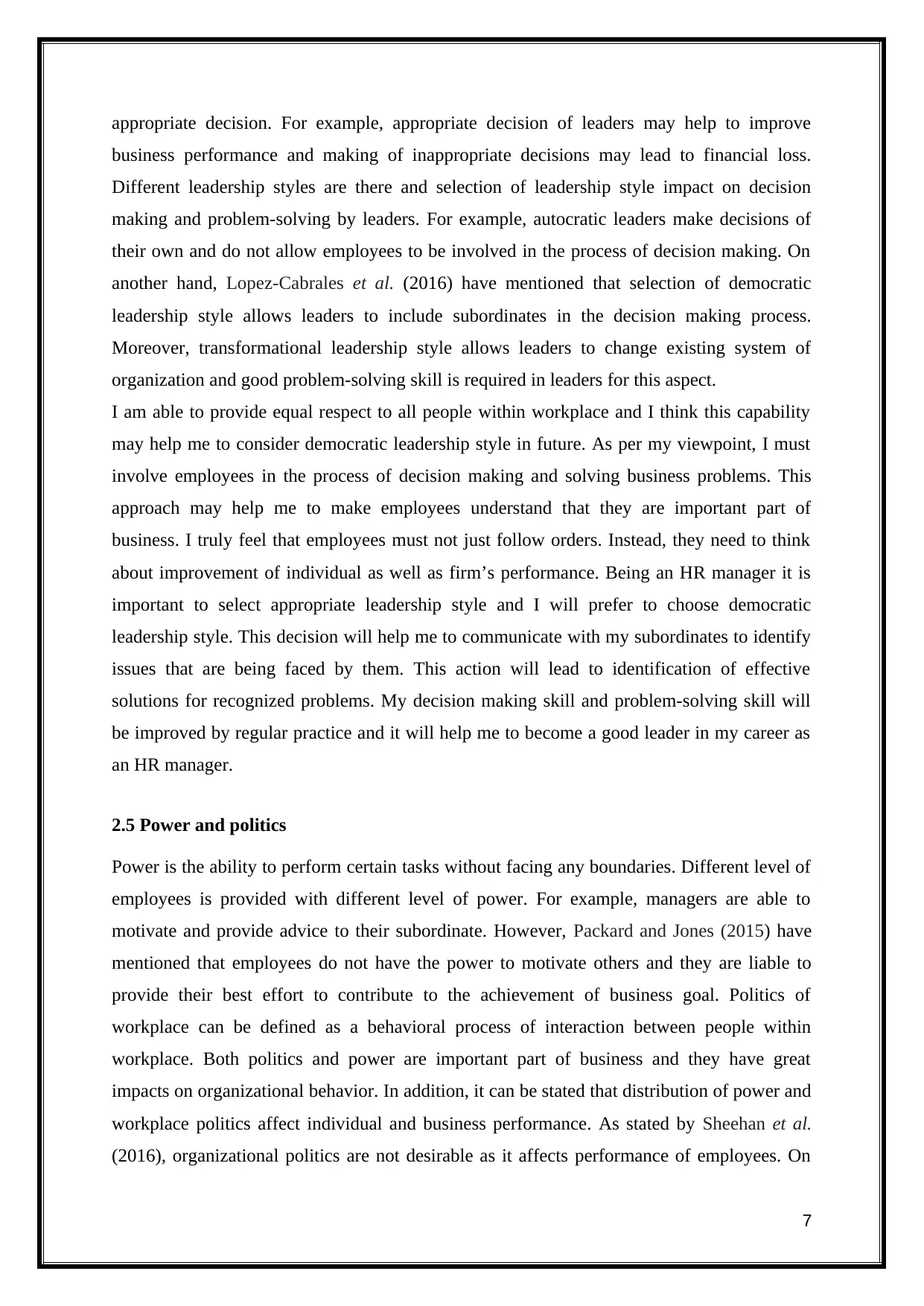
appropriate decision. For example, appropriate decision of leaders may help to improve
business performance and making of inappropriate decisions may lead to financial loss.
Different leadership styles are there and selection of leadership style impact on decision
making and problem-solving by leaders. For example, autocratic leaders make decisions of
their own and do not allow employees to be involved in the process of decision making. On
another hand, Lopez-Cabrales et al. (2016) have mentioned that selection of democratic
leadership style allows leaders to include subordinates in the decision making process.
Moreover, transformational leadership style allows leaders to change existing system of
organization and good problem-solving skill is required in leaders for this aspect.
I am able to provide equal respect to all people within workplace and I think this capability
may help me to consider democratic leadership style in future. As per my viewpoint, I must
involve employees in the process of decision making and solving business problems. This
approach may help me to make employees understand that they are important part of
business. I truly feel that employees must not just follow orders. Instead, they need to think
about improvement of individual as well as firm’s performance. Being an HR manager it is
important to select appropriate leadership style and I will prefer to choose democratic
leadership style. This decision will help me to communicate with my subordinates to identify
issues that are being faced by them. This action will lead to identification of effective
solutions for recognized problems. My decision making skill and problem-solving skill will
be improved by regular practice and it will help me to become a good leader in my career as
an HR manager.
2.5 Power and politics
Power is the ability to perform certain tasks without facing any boundaries. Different level of
employees is provided with different level of power. For example, managers are able to
motivate and provide advice to their subordinate. However, Packard and Jones (2015) have
mentioned that employees do not have the power to motivate others and they are liable to
provide their best effort to contribute to the achievement of business goal. Politics of
workplace can be defined as a behavioral process of interaction between people within
workplace. Both politics and power are important part of business and they have great
impacts on organizational behavior. In addition, it can be stated that distribution of power and
workplace politics affect individual and business performance. As stated by Sheehan et al.
(2016), organizational politics are not desirable as it affects performance of employees. On
7
business performance and making of inappropriate decisions may lead to financial loss.
Different leadership styles are there and selection of leadership style impact on decision
making and problem-solving by leaders. For example, autocratic leaders make decisions of
their own and do not allow employees to be involved in the process of decision making. On
another hand, Lopez-Cabrales et al. (2016) have mentioned that selection of democratic
leadership style allows leaders to include subordinates in the decision making process.
Moreover, transformational leadership style allows leaders to change existing system of
organization and good problem-solving skill is required in leaders for this aspect.
I am able to provide equal respect to all people within workplace and I think this capability
may help me to consider democratic leadership style in future. As per my viewpoint, I must
involve employees in the process of decision making and solving business problems. This
approach may help me to make employees understand that they are important part of
business. I truly feel that employees must not just follow orders. Instead, they need to think
about improvement of individual as well as firm’s performance. Being an HR manager it is
important to select appropriate leadership style and I will prefer to choose democratic
leadership style. This decision will help me to communicate with my subordinates to identify
issues that are being faced by them. This action will lead to identification of effective
solutions for recognized problems. My decision making skill and problem-solving skill will
be improved by regular practice and it will help me to become a good leader in my career as
an HR manager.
2.5 Power and politics
Power is the ability to perform certain tasks without facing any boundaries. Different level of
employees is provided with different level of power. For example, managers are able to
motivate and provide advice to their subordinate. However, Packard and Jones (2015) have
mentioned that employees do not have the power to motivate others and they are liable to
provide their best effort to contribute to the achievement of business goal. Politics of
workplace can be defined as a behavioral process of interaction between people within
workplace. Both politics and power are important part of business and they have great
impacts on organizational behavior. In addition, it can be stated that distribution of power and
workplace politics affect individual and business performance. As stated by Sheehan et al.
(2016), organizational politics are not desirable as it affects performance of employees. On
7
Paraphrase This Document
Need a fresh take? Get an instant paraphrase of this document with our AI Paraphraser
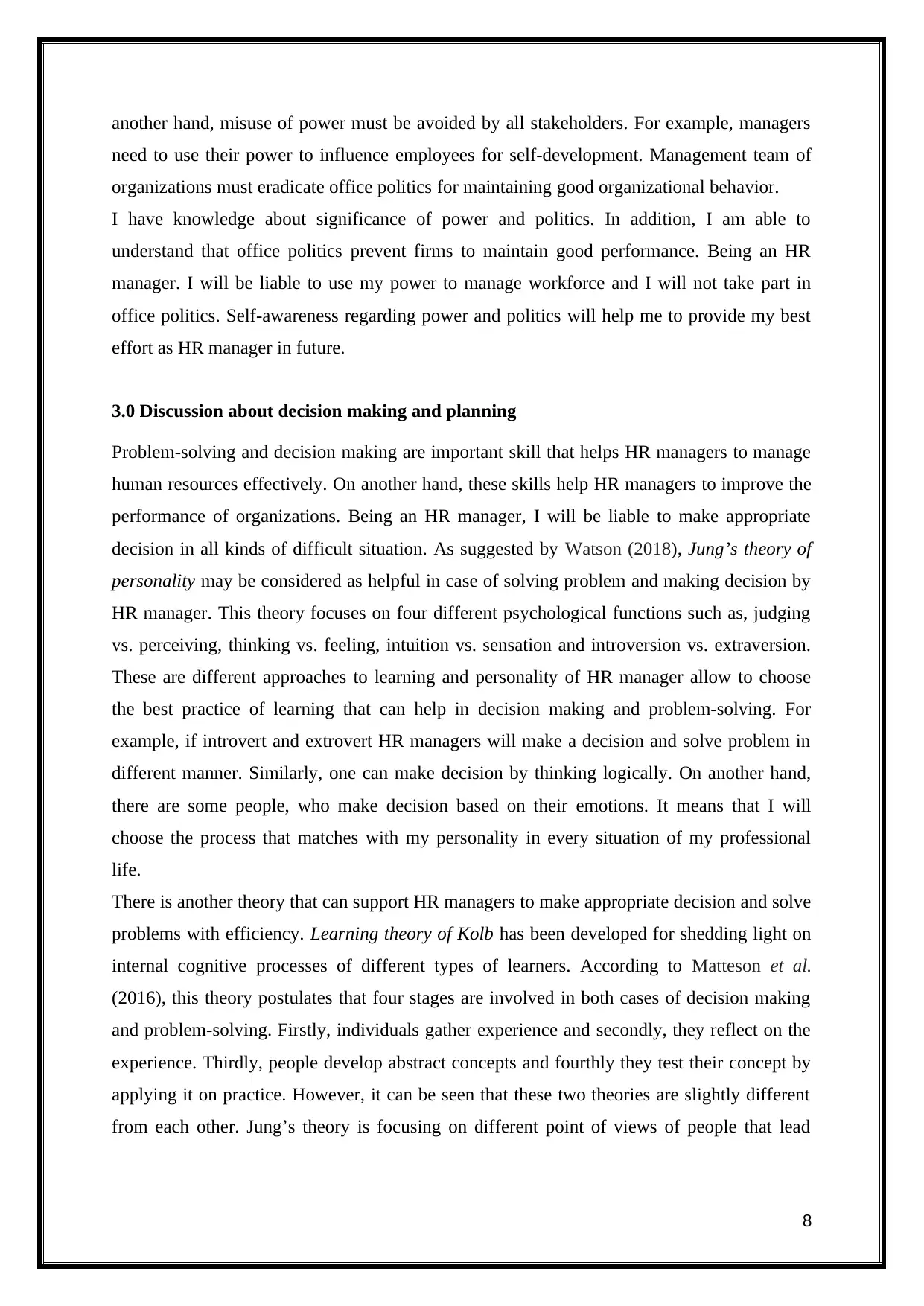
another hand, misuse of power must be avoided by all stakeholders. For example, managers
need to use their power to influence employees for self-development. Management team of
organizations must eradicate office politics for maintaining good organizational behavior.
I have knowledge about significance of power and politics. In addition, I am able to
understand that office politics prevent firms to maintain good performance. Being an HR
manager. I will be liable to use my power to manage workforce and I will not take part in
office politics. Self-awareness regarding power and politics will help me to provide my best
effort as HR manager in future.
3.0 Discussion about decision making and planning
Problem-solving and decision making are important skill that helps HR managers to manage
human resources effectively. On another hand, these skills help HR managers to improve the
performance of organizations. Being an HR manager, I will be liable to make appropriate
decision in all kinds of difficult situation. As suggested by Watson (2018), Jung’s theory of
personality may be considered as helpful in case of solving problem and making decision by
HR manager. This theory focuses on four different psychological functions such as, judging
vs. perceiving, thinking vs. feeling, intuition vs. sensation and introversion vs. extraversion.
These are different approaches to learning and personality of HR manager allow to choose
the best practice of learning that can help in decision making and problem-solving. For
example, if introvert and extrovert HR managers will make a decision and solve problem in
different manner. Similarly, one can make decision by thinking logically. On another hand,
there are some people, who make decision based on their emotions. It means that I will
choose the process that matches with my personality in every situation of my professional
life.
There is another theory that can support HR managers to make appropriate decision and solve
problems with efficiency. Learning theory of Kolb has been developed for shedding light on
internal cognitive processes of different types of learners. According to Matteson et al.
(2016), this theory postulates that four stages are involved in both cases of decision making
and problem-solving. Firstly, individuals gather experience and secondly, they reflect on the
experience. Thirdly, people develop abstract concepts and fourthly they test their concept by
applying it on practice. However, it can be seen that these two theories are slightly different
from each other. Jung’s theory is focusing on different point of views of people that lead
8
need to use their power to influence employees for self-development. Management team of
organizations must eradicate office politics for maintaining good organizational behavior.
I have knowledge about significance of power and politics. In addition, I am able to
understand that office politics prevent firms to maintain good performance. Being an HR
manager. I will be liable to use my power to manage workforce and I will not take part in
office politics. Self-awareness regarding power and politics will help me to provide my best
effort as HR manager in future.
3.0 Discussion about decision making and planning
Problem-solving and decision making are important skill that helps HR managers to manage
human resources effectively. On another hand, these skills help HR managers to improve the
performance of organizations. Being an HR manager, I will be liable to make appropriate
decision in all kinds of difficult situation. As suggested by Watson (2018), Jung’s theory of
personality may be considered as helpful in case of solving problem and making decision by
HR manager. This theory focuses on four different psychological functions such as, judging
vs. perceiving, thinking vs. feeling, intuition vs. sensation and introversion vs. extraversion.
These are different approaches to learning and personality of HR manager allow to choose
the best practice of learning that can help in decision making and problem-solving. For
example, if introvert and extrovert HR managers will make a decision and solve problem in
different manner. Similarly, one can make decision by thinking logically. On another hand,
there are some people, who make decision based on their emotions. It means that I will
choose the process that matches with my personality in every situation of my professional
life.
There is another theory that can support HR managers to make appropriate decision and solve
problems with efficiency. Learning theory of Kolb has been developed for shedding light on
internal cognitive processes of different types of learners. According to Matteson et al.
(2016), this theory postulates that four stages are involved in both cases of decision making
and problem-solving. Firstly, individuals gather experience and secondly, they reflect on the
experience. Thirdly, people develop abstract concepts and fourthly they test their concept by
applying it on practice. However, it can be seen that these two theories are slightly different
from each other. Jung’s theory is focusing on different point of views of people that lead
8
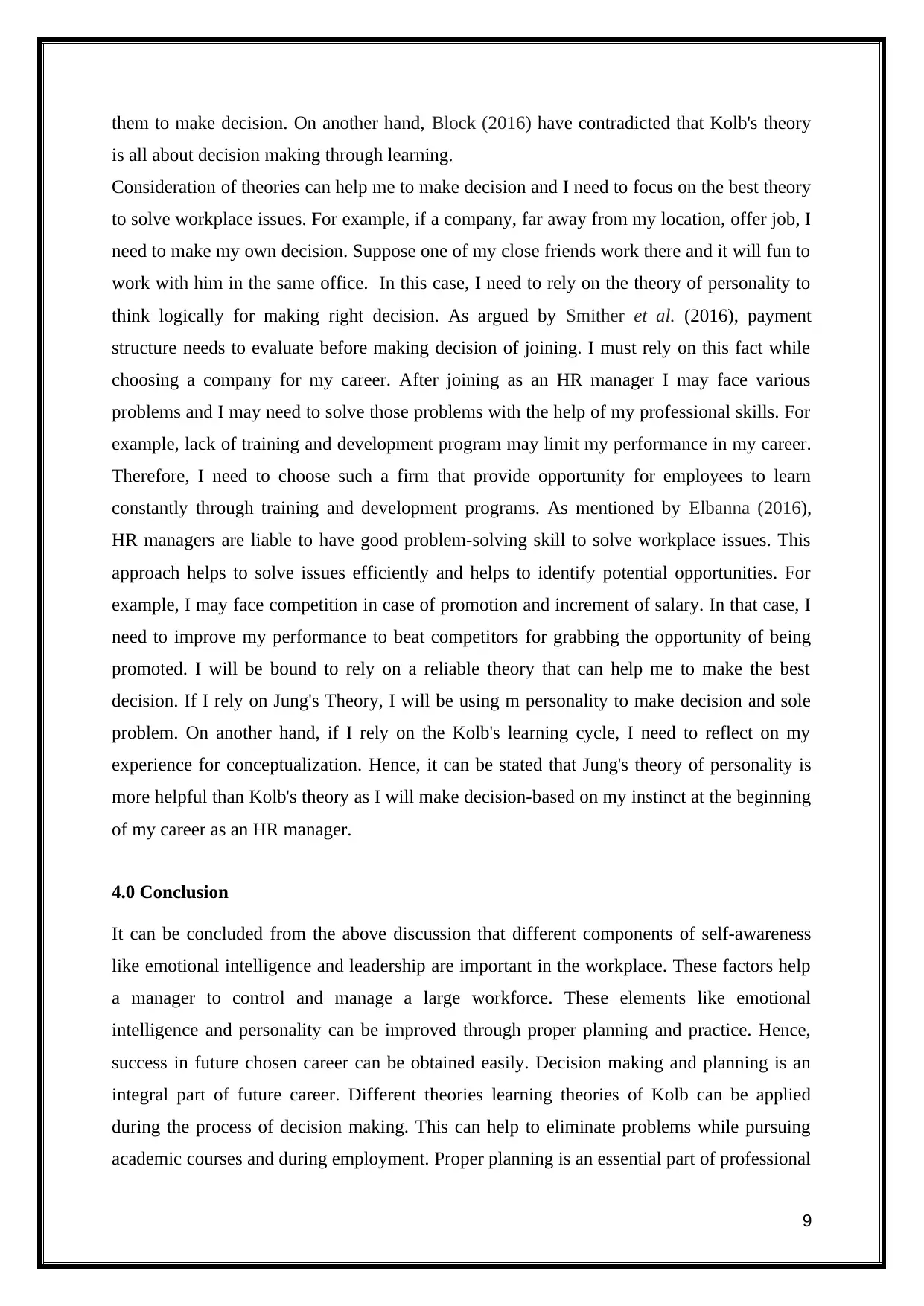
them to make decision. On another hand, Block (2016) have contradicted that Kolb's theory
is all about decision making through learning.
Consideration of theories can help me to make decision and I need to focus on the best theory
to solve workplace issues. For example, if a company, far away from my location, offer job, I
need to make my own decision. Suppose one of my close friends work there and it will fun to
work with him in the same office. In this case, I need to rely on the theory of personality to
think logically for making right decision. As argued by Smither et al. (2016), payment
structure needs to evaluate before making decision of joining. I must rely on this fact while
choosing a company for my career. After joining as an HR manager I may face various
problems and I may need to solve those problems with the help of my professional skills. For
example, lack of training and development program may limit my performance in my career.
Therefore, I need to choose such a firm that provide opportunity for employees to learn
constantly through training and development programs. As mentioned by Elbanna (2016),
HR managers are liable to have good problem-solving skill to solve workplace issues. This
approach helps to solve issues efficiently and helps to identify potential opportunities. For
example, I may face competition in case of promotion and increment of salary. In that case, I
need to improve my performance to beat competitors for grabbing the opportunity of being
promoted. I will be bound to rely on a reliable theory that can help me to make the best
decision. If I rely on Jung's Theory, I will be using m personality to make decision and sole
problem. On another hand, if I rely on the Kolb's learning cycle, I need to reflect on my
experience for conceptualization. Hence, it can be stated that Jung's theory of personality is
more helpful than Kolb's theory as I will make decision-based on my instinct at the beginning
of my career as an HR manager.
4.0 Conclusion
It can be concluded from the above discussion that different components of self-awareness
like emotional intelligence and leadership are important in the workplace. These factors help
a manager to control and manage a large workforce. These elements like emotional
intelligence and personality can be improved through proper planning and practice. Hence,
success in future chosen career can be obtained easily. Decision making and planning is an
integral part of future career. Different theories learning theories of Kolb can be applied
during the process of decision making. This can help to eliminate problems while pursuing
academic courses and during employment. Proper planning is an essential part of professional
9
is all about decision making through learning.
Consideration of theories can help me to make decision and I need to focus on the best theory
to solve workplace issues. For example, if a company, far away from my location, offer job, I
need to make my own decision. Suppose one of my close friends work there and it will fun to
work with him in the same office. In this case, I need to rely on the theory of personality to
think logically for making right decision. As argued by Smither et al. (2016), payment
structure needs to evaluate before making decision of joining. I must rely on this fact while
choosing a company for my career. After joining as an HR manager I may face various
problems and I may need to solve those problems with the help of my professional skills. For
example, lack of training and development program may limit my performance in my career.
Therefore, I need to choose such a firm that provide opportunity for employees to learn
constantly through training and development programs. As mentioned by Elbanna (2016),
HR managers are liable to have good problem-solving skill to solve workplace issues. This
approach helps to solve issues efficiently and helps to identify potential opportunities. For
example, I may face competition in case of promotion and increment of salary. In that case, I
need to improve my performance to beat competitors for grabbing the opportunity of being
promoted. I will be bound to rely on a reliable theory that can help me to make the best
decision. If I rely on Jung's Theory, I will be using m personality to make decision and sole
problem. On another hand, if I rely on the Kolb's learning cycle, I need to reflect on my
experience for conceptualization. Hence, it can be stated that Jung's theory of personality is
more helpful than Kolb's theory as I will make decision-based on my instinct at the beginning
of my career as an HR manager.
4.0 Conclusion
It can be concluded from the above discussion that different components of self-awareness
like emotional intelligence and leadership are important in the workplace. These factors help
a manager to control and manage a large workforce. These elements like emotional
intelligence and personality can be improved through proper planning and practice. Hence,
success in future chosen career can be obtained easily. Decision making and planning is an
integral part of future career. Different theories learning theories of Kolb can be applied
during the process of decision making. This can help to eliminate problems while pursuing
academic courses and during employment. Proper planning is an essential part of professional
9
⊘ This is a preview!⊘
Do you want full access?
Subscribe today to unlock all pages.

Trusted by 1+ million students worldwide
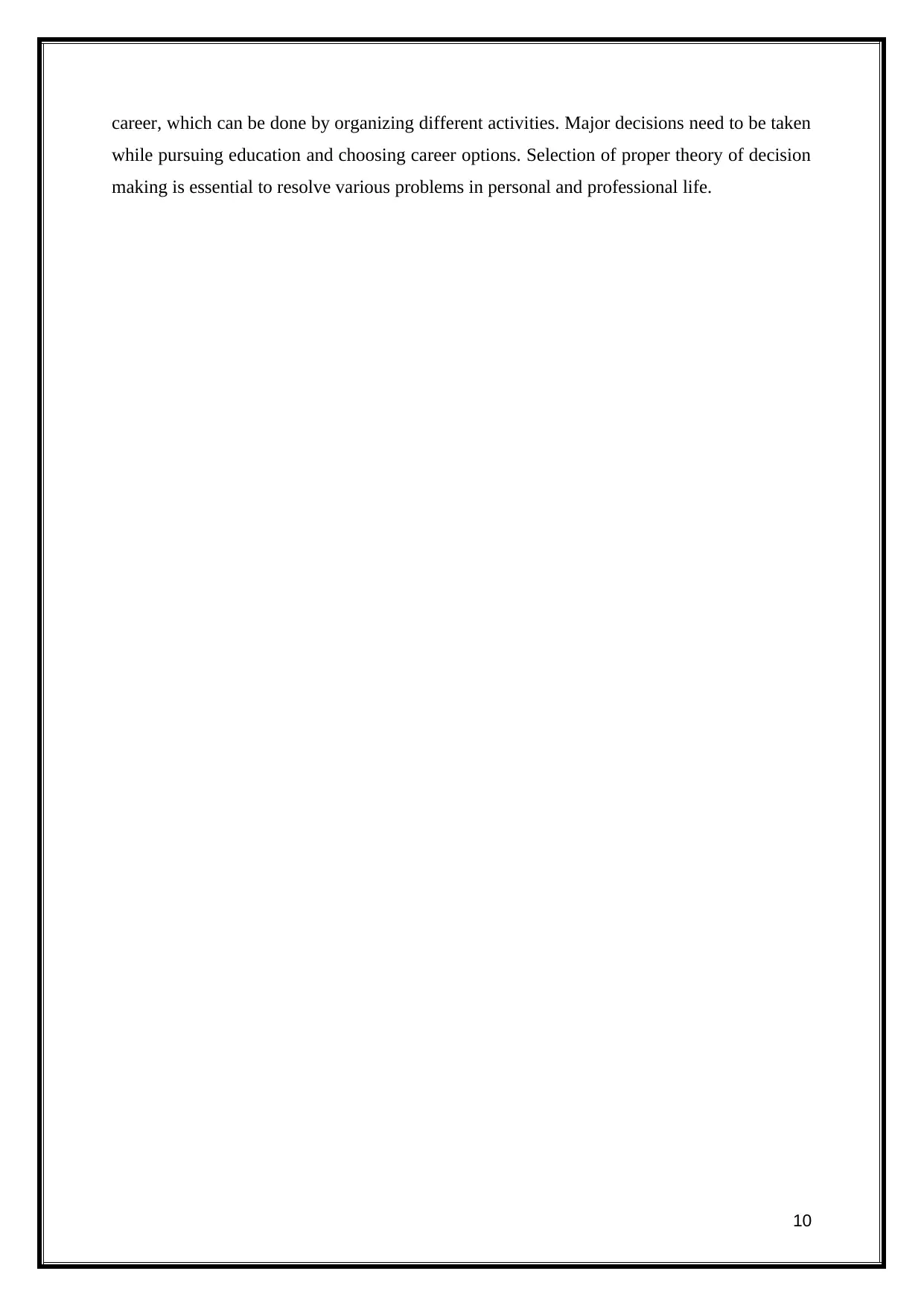
career, which can be done by organizing different activities. Major decisions need to be taken
while pursuing education and choosing career options. Selection of proper theory of decision
making is essential to resolve various problems in personal and professional life.
10
while pursuing education and choosing career options. Selection of proper theory of decision
making is essential to resolve various problems in personal and professional life.
10
Paraphrase This Document
Need a fresh take? Get an instant paraphrase of this document with our AI Paraphraser
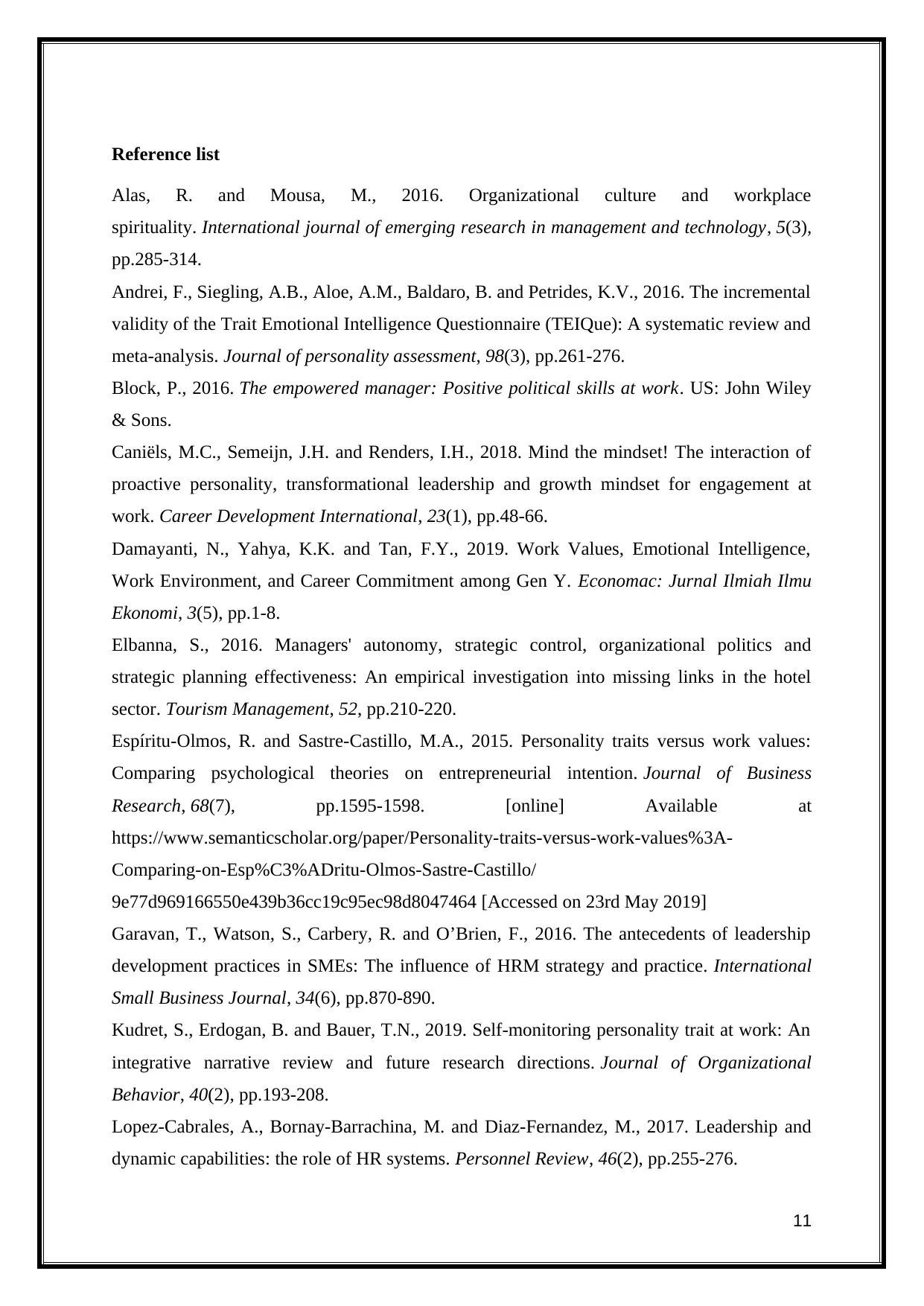
Reference list
Alas, R. and Mousa, M., 2016. Organizational culture and workplace
spirituality. International journal of emerging research in management and technology, 5(3),
pp.285-314.
Andrei, F., Siegling, A.B., Aloe, A.M., Baldaro, B. and Petrides, K.V., 2016. The incremental
validity of the Trait Emotional Intelligence Questionnaire (TEIQue): A systematic review and
meta-analysis. Journal of personality assessment, 98(3), pp.261-276.
Block, P., 2016. The empowered manager: Positive political skills at work. US: John Wiley
& Sons.
Caniëls, M.C., Semeijn, J.H. and Renders, I.H., 2018. Mind the mindset! The interaction of
proactive personality, transformational leadership and growth mindset for engagement at
work. Career Development International, 23(1), pp.48-66.
Damayanti, N., Yahya, K.K. and Tan, F.Y., 2019. Work Values, Emotional Intelligence,
Work Environment, and Career Commitment among Gen Y. Economac: Jurnal Ilmiah Ilmu
Ekonomi, 3(5), pp.1-8.
Elbanna, S., 2016. Managers' autonomy, strategic control, organizational politics and
strategic planning effectiveness: An empirical investigation into missing links in the hotel
sector. Tourism Management, 52, pp.210-220.
Espíritu-Olmos, R. and Sastre-Castillo, M.A., 2015. Personality traits versus work values:
Comparing psychological theories on entrepreneurial intention. Journal of Business
Research, 68(7), pp.1595-1598. [online] Available at
https://www.semanticscholar.org/paper/Personality-traits-versus-work-values%3A-
Comparing-on-Esp%C3%ADritu-Olmos-Sastre-Castillo/
9e77d969166550e439b36cc19c95ec98d8047464 [Accessed on 23rd May 2019]
Garavan, T., Watson, S., Carbery, R. and O’Brien, F., 2016. The antecedents of leadership
development practices in SMEs: The influence of HRM strategy and practice. International
Small Business Journal, 34(6), pp.870-890.
Kudret, S., Erdogan, B. and Bauer, T.N., 2019. Self‐monitoring personality trait at work: An
integrative narrative review and future research directions. Journal of Organizational
Behavior, 40(2), pp.193-208.
Lopez-Cabrales, A., Bornay-Barrachina, M. and Diaz-Fernandez, M., 2017. Leadership and
dynamic capabilities: the role of HR systems. Personnel Review, 46(2), pp.255-276.
11
Alas, R. and Mousa, M., 2016. Organizational culture and workplace
spirituality. International journal of emerging research in management and technology, 5(3),
pp.285-314.
Andrei, F., Siegling, A.B., Aloe, A.M., Baldaro, B. and Petrides, K.V., 2016. The incremental
validity of the Trait Emotional Intelligence Questionnaire (TEIQue): A systematic review and
meta-analysis. Journal of personality assessment, 98(3), pp.261-276.
Block, P., 2016. The empowered manager: Positive political skills at work. US: John Wiley
& Sons.
Caniëls, M.C., Semeijn, J.H. and Renders, I.H., 2018. Mind the mindset! The interaction of
proactive personality, transformational leadership and growth mindset for engagement at
work. Career Development International, 23(1), pp.48-66.
Damayanti, N., Yahya, K.K. and Tan, F.Y., 2019. Work Values, Emotional Intelligence,
Work Environment, and Career Commitment among Gen Y. Economac: Jurnal Ilmiah Ilmu
Ekonomi, 3(5), pp.1-8.
Elbanna, S., 2016. Managers' autonomy, strategic control, organizational politics and
strategic planning effectiveness: An empirical investigation into missing links in the hotel
sector. Tourism Management, 52, pp.210-220.
Espíritu-Olmos, R. and Sastre-Castillo, M.A., 2015. Personality traits versus work values:
Comparing psychological theories on entrepreneurial intention. Journal of Business
Research, 68(7), pp.1595-1598. [online] Available at
https://www.semanticscholar.org/paper/Personality-traits-versus-work-values%3A-
Comparing-on-Esp%C3%ADritu-Olmos-Sastre-Castillo/
9e77d969166550e439b36cc19c95ec98d8047464 [Accessed on 23rd May 2019]
Garavan, T., Watson, S., Carbery, R. and O’Brien, F., 2016. The antecedents of leadership
development practices in SMEs: The influence of HRM strategy and practice. International
Small Business Journal, 34(6), pp.870-890.
Kudret, S., Erdogan, B. and Bauer, T.N., 2019. Self‐monitoring personality trait at work: An
integrative narrative review and future research directions. Journal of Organizational
Behavior, 40(2), pp.193-208.
Lopez-Cabrales, A., Bornay-Barrachina, M. and Diaz-Fernandez, M., 2017. Leadership and
dynamic capabilities: the role of HR systems. Personnel Review, 46(2), pp.255-276.
11
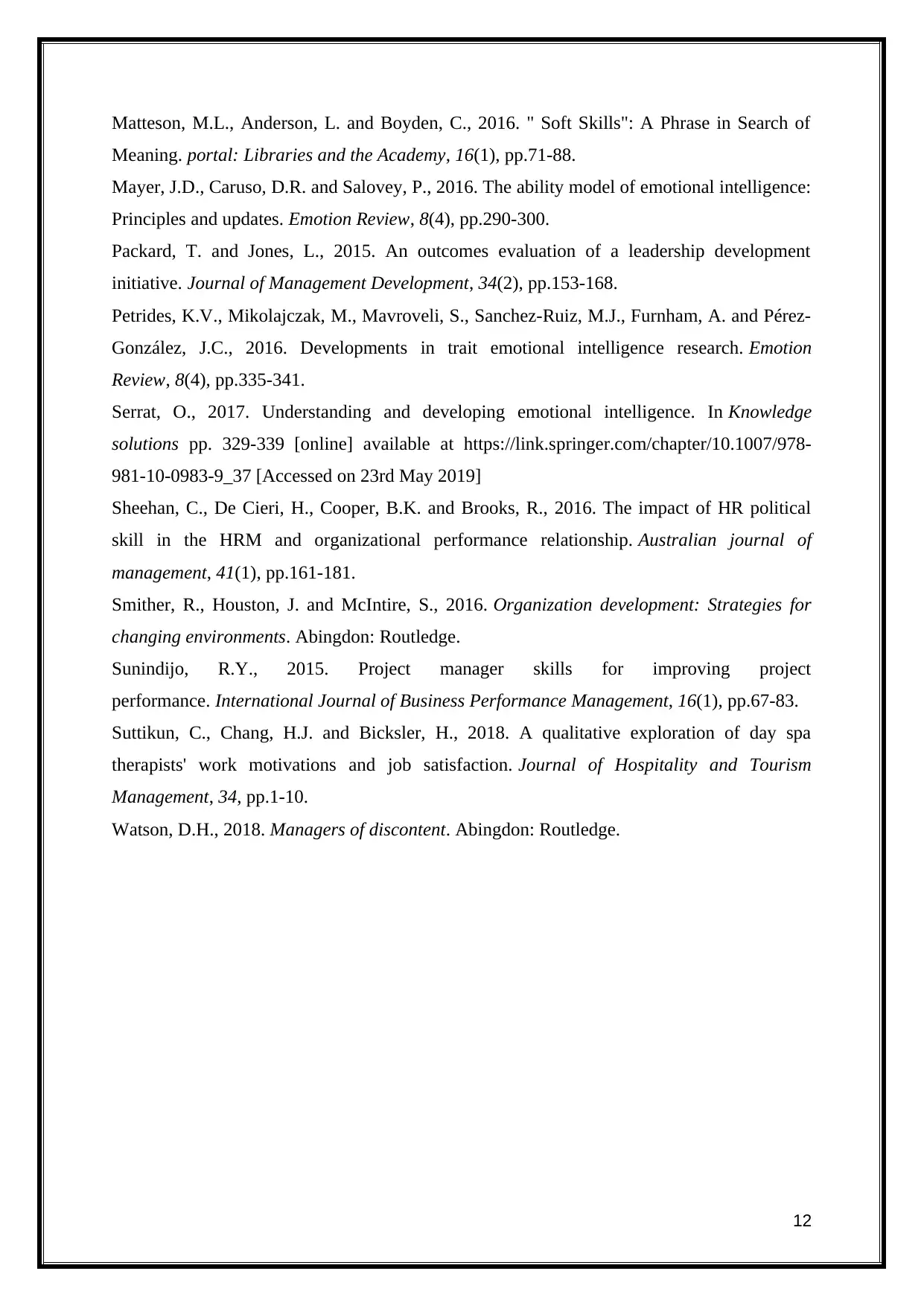
Matteson, M.L., Anderson, L. and Boyden, C., 2016. " Soft Skills": A Phrase in Search of
Meaning. portal: Libraries and the Academy, 16(1), pp.71-88.
Mayer, J.D., Caruso, D.R. and Salovey, P., 2016. The ability model of emotional intelligence:
Principles and updates. Emotion Review, 8(4), pp.290-300.
Packard, T. and Jones, L., 2015. An outcomes evaluation of a leadership development
initiative. Journal of Management Development, 34(2), pp.153-168.
Petrides, K.V., Mikolajczak, M., Mavroveli, S., Sanchez-Ruiz, M.J., Furnham, A. and Pérez-
González, J.C., 2016. Developments in trait emotional intelligence research. Emotion
Review, 8(4), pp.335-341.
Serrat, O., 2017. Understanding and developing emotional intelligence. In Knowledge
solutions pp. 329-339 [online] available at https://link.springer.com/chapter/10.1007/978-
981-10-0983-9_37 [Accessed on 23rd May 2019]
Sheehan, C., De Cieri, H., Cooper, B.K. and Brooks, R., 2016. The impact of HR political
skill in the HRM and organizational performance relationship. Australian journal of
management, 41(1), pp.161-181.
Smither, R., Houston, J. and McIntire, S., 2016. Organization development: Strategies for
changing environments. Abingdon: Routledge.
Sunindijo, R.Y., 2015. Project manager skills for improving project
performance. International Journal of Business Performance Management, 16(1), pp.67-83.
Suttikun, C., Chang, H.J. and Bicksler, H., 2018. A qualitative exploration of day spa
therapists' work motivations and job satisfaction. Journal of Hospitality and Tourism
Management, 34, pp.1-10.
Watson, D.H., 2018. Managers of discontent. Abingdon: Routledge.
12
Meaning. portal: Libraries and the Academy, 16(1), pp.71-88.
Mayer, J.D., Caruso, D.R. and Salovey, P., 2016. The ability model of emotional intelligence:
Principles and updates. Emotion Review, 8(4), pp.290-300.
Packard, T. and Jones, L., 2015. An outcomes evaluation of a leadership development
initiative. Journal of Management Development, 34(2), pp.153-168.
Petrides, K.V., Mikolajczak, M., Mavroveli, S., Sanchez-Ruiz, M.J., Furnham, A. and Pérez-
González, J.C., 2016. Developments in trait emotional intelligence research. Emotion
Review, 8(4), pp.335-341.
Serrat, O., 2017. Understanding and developing emotional intelligence. In Knowledge
solutions pp. 329-339 [online] available at https://link.springer.com/chapter/10.1007/978-
981-10-0983-9_37 [Accessed on 23rd May 2019]
Sheehan, C., De Cieri, H., Cooper, B.K. and Brooks, R., 2016. The impact of HR political
skill in the HRM and organizational performance relationship. Australian journal of
management, 41(1), pp.161-181.
Smither, R., Houston, J. and McIntire, S., 2016. Organization development: Strategies for
changing environments. Abingdon: Routledge.
Sunindijo, R.Y., 2015. Project manager skills for improving project
performance. International Journal of Business Performance Management, 16(1), pp.67-83.
Suttikun, C., Chang, H.J. and Bicksler, H., 2018. A qualitative exploration of day spa
therapists' work motivations and job satisfaction. Journal of Hospitality and Tourism
Management, 34, pp.1-10.
Watson, D.H., 2018. Managers of discontent. Abingdon: Routledge.
12
⊘ This is a preview!⊘
Do you want full access?
Subscribe today to unlock all pages.

Trusted by 1+ million students worldwide
1 out of 12
Related Documents
Your All-in-One AI-Powered Toolkit for Academic Success.
+13062052269
info@desklib.com
Available 24*7 on WhatsApp / Email
![[object Object]](/_next/static/media/star-bottom.7253800d.svg)
Unlock your academic potential
Copyright © 2020–2026 A2Z Services. All Rights Reserved. Developed and managed by ZUCOL.





